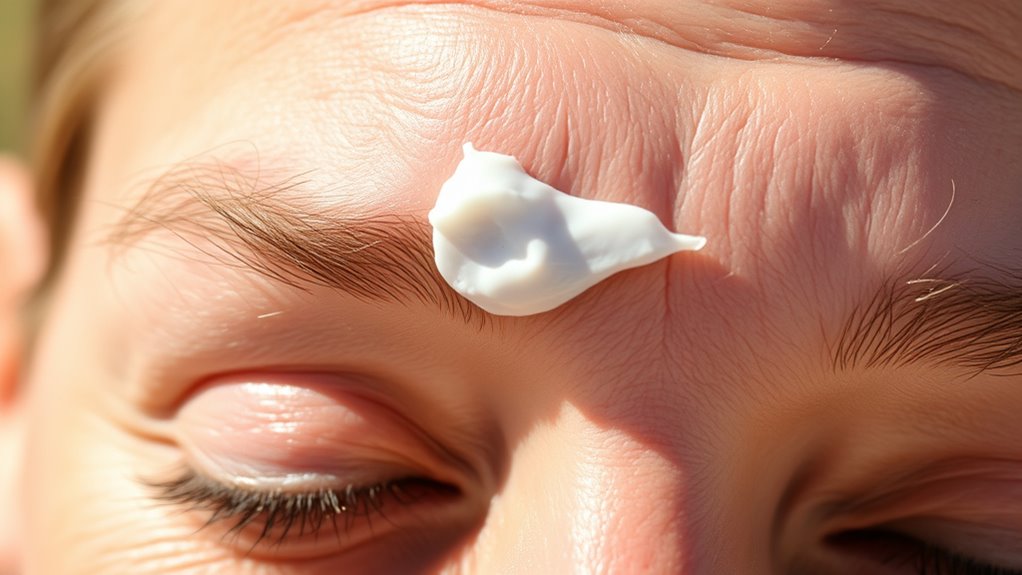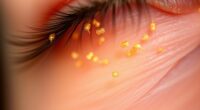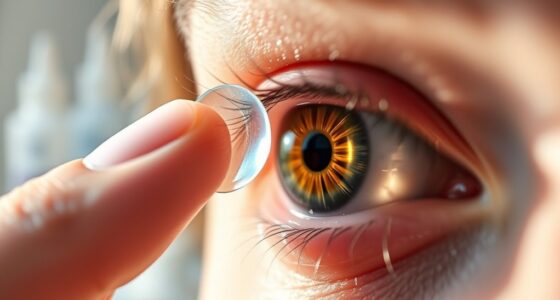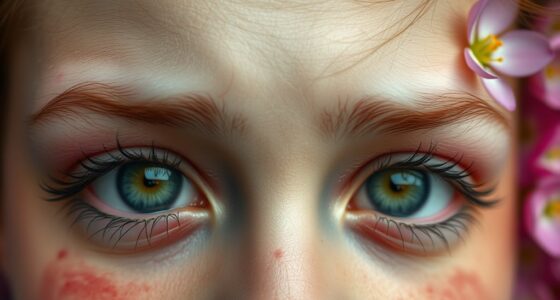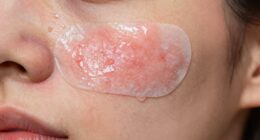Many people skip applying sunscreen on their eyelids because they underestimate how thin, delicate, and UV-sensitive this skin is. The eyelids are vulnerable to UV rays, which can cause sunburns, premature aging, pigmentation, and even skin cancers. Because the skin there is so thin, it absorbs more UV radiation, increasing damage risk. If you want to protect your eyes and skin long-term, understanding these risks can help you take better UV precautions.
Key Takeaways
- Many avoid applying sunscreen on eyelids due to fear of eye irritation or discomfort.
- People often underestimate UV exposure risk to the delicate, thin eyelid skin.
- Applying sunscreen near the eyes can be tricky, leading to accidental irritation or discomfort.
- Lack of awareness about eyelid vulnerability results in neglecting this sensitive area.
- Some believe makeup or other products suffice, overlooking the need for dedicated eyelid sun protection.
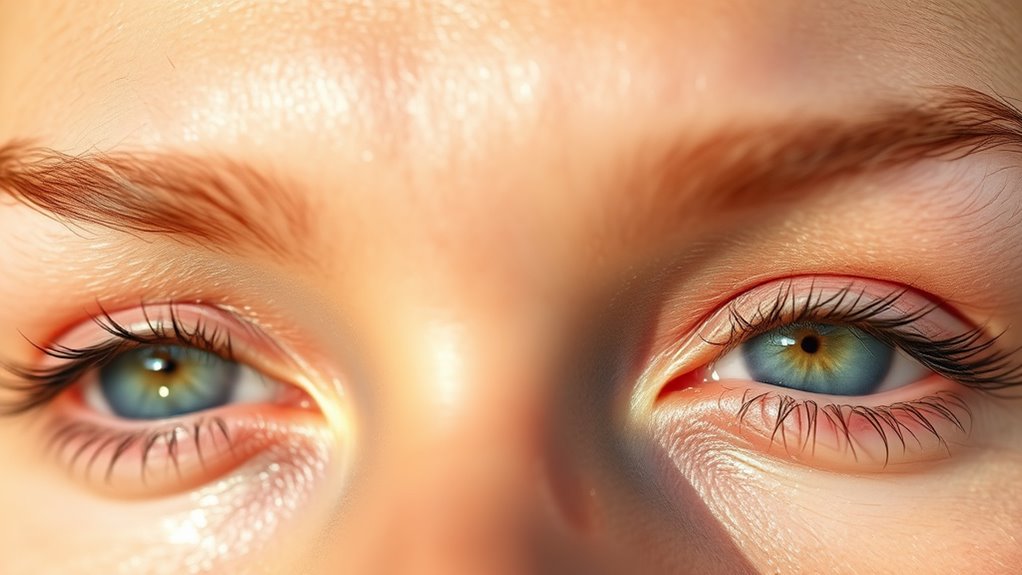
Your eyelids are often overlooked when applying sunscreen, but they deserve just as much protection as the rest of your face. Many people skip this step, unaware that the skin on your lids is thin and especially vulnerable to UV damage. Because the skin here is delicate, it’s more prone to sunburns, premature aging, and even skin cancer if you don’t shield it properly. Eye protection isn’t just about sunglasses—applying sunscreen on your lids is a vital part of the process. Without it, UV rays can penetrate through the thin skin, increasing your risk of long-term damage.
Protect your delicate eyelids with sunscreen to prevent sunburn, aging, and skin cancer.
Most people don’t realize that the eyes are particularly sensitive to UV rays, and damage can occur even if you’re not directly in the sun. UV damage to the eyelids can contribute to early wrinkles, sagging skin, and pigmentation changes. More seriously, prolonged exposure can lead to basal cell carcinoma or squamous cell carcinoma, the most common types of skin cancer affecting the eyelid region. Because the skin here is so thin, it absorbs UV rays more readily, making it essential to take extra precautions.
You might think that wearing sunglasses or hats is enough to protect your eyes, but that’s only part of the solution. Sunscreen on lids complements your eye protection strategy. To do this effectively, choose a broad-spectrum sunscreen with at least SPF 30. Apply it gently using your fingertip, ensuring you cover the entire eyelid area, including the lash line. Be cautious not to get sunscreen in your eyes—use a small amount and avoid rubbing your eyes afterward. If you wear makeup, you can also look for mineral-based sunscreens or specially formulated eye-safe products to add an extra layer of defense.
Furthermore, understanding UV penetration and how it affects delicate skin can help you make better decisions about sun protection. People often neglect to reapply sunscreen to their eyelids because they think it’s unnecessary or worry about irritation. However, reapplication is just as important as initial application, especially if you spend a lot of time outdoors or are exposed to UV rays for extended periods. Remember, UV damage isn’t always noticeable right away, but it accumulates over time, increasing your risk of serious eye and skin conditions later. Protecting your eyelids with proper sunscreen application is a simple step that can make a significant difference in maintaining your skin’s health and your overall eye protection. Don’t ignore this often-overlooked spot—your future self will thank you.
Frequently Asked Questions
Can Sunscreen on Lids Prevent Eye Aging?
Applying sunscreen to your eye area can help prevent aging caused by UV rays. While it won’t completely stop eye aging, it provides essential UV protection for the delicate skin around your eyes. Regularly shielding this sensitive spot reduces fine lines, wrinkles, and sun spots. So, don’t skip your eyelids—make sunscreen a habit, and you’ll support healthier, younger-looking skin around your eyes over time.
Are There Special Sunscreens for Eyelid Skin?
You might wonder if there are special sunscreens for eyelid skin. Yes, eyelid sunscreens are formulated to provide sensitive skin protection, often being gentler and less greasy. These products help shield your delicate eyelid area from UV rays without causing irritation. Using an eyelid-specific sunscreen guarantees you get effective sun protection while respecting your skin’s sensitivity, reducing the risk of early aging and damage around your eyes.
How Often Should I Reapply Sunscreen on My Lids?
You should reapply sunscreen on your lids every two hours to maintain ideal eyelid protection. If you’re sweating, swimming, or towel-drying, reapply more frequently. Since eyelids are especially sensitive and prone to UV damage, consistent reapplication is key. Use a broad-spectrum sunscreen and consider a lightweight, non-irritating formula to guarantee your eyelids stay protected without discomfort. Stay vigilant to prevent long-term skin damage.
Is Sunscreen Necessary if I Wear Sunglasses?
Your eyelids are the most UV-sensitive spot, and sunscreen myths often lead you to believe sunglasses alone protect you completely. While sunglasses block much UV, they don’t provide eyelid protection, which is vital for preventing damage. Sunscreen is necessary even if you wear sunglasses, as it offers a protective shield for this delicate area. Don’t rely solely on sunglasses; sunscreen acts as your ultimate defense against harmful rays.
Can Sunscreen Cause Irritation on Sensitive Eyelid Skin?
You might wonder if sunscreen causes irritation on your sensitive eyelid skin. It’s possible, especially if you have eyelid sensitivity, since some formulas contain ingredients that can irritate. To minimize sunscreen irritation, look for mineral-based sunscreens with zinc oxide or titanium dioxide, which are gentler on delicate skin. Always do a patch test first and avoid applying too close to your eyes to prevent discomfort.
Conclusion
Don’t forget your lids—they’re like the windshield of your car, protecting your eyes from harmful UV rays. I once skipped sunscreen on mine during a sunny hike, only to end up with a painful sunburn that lasted days. Studies show many neglect this sensitive spot, risking damage over time. So, think of your lids as a delicate window—cover them well, and you’ll keep your eyes safe while enjoying the sunshine without worry.
